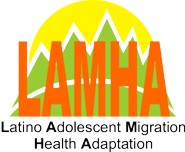LAMHA is a mixed method descriptive study of the mental health status and needs of Latino youth and their families. LAMHA looks to provide data on the mental health status among first-generation Latino youth and their caregivers, to describe the characteristics of the community, school, and family contexts that affect the well-being of Latino immigrant youth, and to detail the experiences of immigrant Latino youth. Original data are collected from youth and one caregiver in the home. The project is funded by the William T. Grant foundation for three years.
In North Carolina, the Latino population has grown 394% from 77 thousand in 1990 to 379 thousand in 2000. This growth has created many new challenges for North Carolina’s health and social service organizations. One area where resources and data are especially lacking is mental health. This project is the first population-based study of mental health, migration, and acculturation among first-generation Latino youth living in North Carolina.
A total of 500 surveys (250 youth ages 12-18 and 250 primary caregivers) and 25 in-depth interviews were conducted between August 2004 and February 2006. Youth were included in study if they were residents in high-growth Latino communities in North Carolina and were born in Latin America.
To locate possible participants high schools were chosen using a stratified random sample. High schools serving large, high growth Latino communities were classified into two strata – urban and rural. Two high schools from the urban and two high schools from the rural strata were randomly selected. For each high school selected, a middle school feeder was selected with a probability proportional to the percentage of the high school’s entering Latino class that come from the feeder.
The data collection instruments include a structured survey with questions from the Children’s Depression Inventory, Child Behavior Checklist, and Trauma Symptom Checklist for Children, the Modified PTSD Symptom Scale for adults, FACES II, and the Psychological Acculturation Scale. Additional items will include data on socio-economic background, discrimination experiences, familism, social support, and school experiences. After the completion of the survey, some participants were asked to complete an in-depth open-ended interview to gather more detailed information regarding the migration and acculturation experiences of youth and their primary caregiver.
Codebooks and datasets are available for study and provide opportunities to increase knowledge of the mental health needs of Latino youth and their families. Due to the extensive nature of the survey booklet, new types of analyses are possible and offer an opportunity for researchers to learn more about the situation of new immigrant families.
